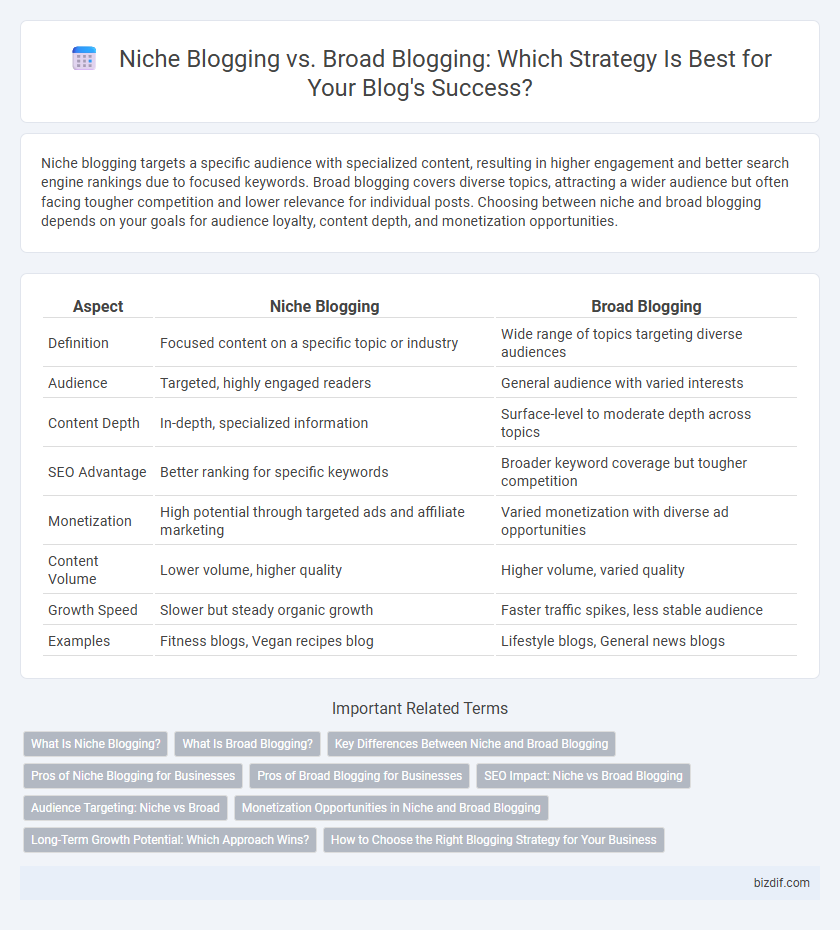Niche blogging targets a specific audience with specialized content, resulting in higher engagement and better search engine rankings due to focused keywords. Broad blogging covers diverse topics, attracting a wider audience but often facing tougher competition and lower relevance for individual posts. Choosing between niche and broad blogging depends on your goals for audience loyalty, content depth, and monetization opportunities.
Table of Comparison
| Aspect | Niche Blogging | Broad Blogging |
|---|---|---|
| Definition | Focused content on a specific topic or industry | Wide range of topics targeting diverse audiences |
| Audience | Targeted, highly engaged readers | General audience with varied interests |
| Content Depth | In-depth, specialized information | Surface-level to moderate depth across topics |
| SEO Advantage | Better ranking for specific keywords | Broader keyword coverage but tougher competition |
| Monetization | High potential through targeted ads and affiliate marketing | Varied monetization with diverse ad opportunities |
| Content Volume | Lower volume, higher quality | Higher volume, varied quality |
| Growth Speed | Slower but steady organic growth | Faster traffic spikes, less stable audience |
| Examples | Fitness blogs, Vegan recipes blog | Lifestyle blogs, General news blogs |
What Is Niche Blogging?
Niche blogging targets a specific audience by focusing on a distinct topic or interest, such as vegan recipes, travel photography, or personal finance for millennials. This approach allows bloggers to build authority, attract loyal readers, and rank higher in search engines due to highly relevant content. Compared to broad blogging, niche blogs benefit from reduced competition and stronger engagement by addressing detailed user needs and keyword phrases.
What Is Broad Blogging?
Broad blogging covers a wide range of topics within a general category, attracting diverse audiences and offering flexibility in content creation. Unlike niche blogging, which targets specific interests or demographics, broad blogging emphasizes variety to appeal to a larger market and increase traffic potential. Successful broad blogs leverage SEO strategies and consistent quality to rank across multiple keyword areas, enhancing visibility and monetization opportunities.
Key Differences Between Niche and Broad Blogging
Niche blogging targets a specific audience with specialized content, resulting in higher engagement and authority in that subject area. Broad blogging covers a wide range of topics, attracting a diverse readership but often facing challenges in establishing deep expertise or loyalty. Key differences include audience focus, content depth, and potential for monetization, with niche blogs typically offering better opportunities for targeted advertising and affiliate marketing.
Pros of Niche Blogging for Businesses
Niche blogging drives targeted traffic by attracting a specific audience interested in particular products or services, boosting conversion rates for businesses. It enhances brand authority and trust as content caters to specialized topics, positioning companies as experts within their industry. Lower competition in niche markets allows businesses to rank higher in search engine results, leading to increased organic visibility and sustained growth.
Pros of Broad Blogging for Businesses
Broad blogging offers businesses the advantage of reaching a wider audience by covering diverse topics, which increases website traffic and brand exposure. This approach improves SEO performance through a variety of keywords, enhancing search engine rankings and attracting more potential customers. Additionally, broad blogging allows companies to test different content areas to identify what resonates best with their target market, driving engagement and conversions.
SEO Impact: Niche vs Broad Blogging
Niche blogging enhances SEO impact by targeting specific keywords with lower competition, leading to higher search engine rankings and more qualified traffic. Broad blogging covers diverse topics but often faces keyword dilution and intense competition, reducing overall SEO effectiveness. Focusing on a niche allows for deeper content relevance, increased user engagement, and stronger authority within a particular market segment.
Audience Targeting: Niche vs Broad
Niche blogging targets a specific, well-defined audience, allowing for tailored content that meets particular interests and drives higher engagement. Broad blogging appeals to a wider audience, which can increase traffic volume but may dilute relevance and reduce reader loyalty. Effective audience targeting in niche blogging often results in stronger brand authority and better conversion rates compared to broad blogging strategies.
Monetization Opportunities in Niche and Broad Blogging
Niche blogging offers targeted monetization opportunities through specialized affiliate programs, higher conversion rates, and premium advertising tailored to a specific audience. Broad blogging attracts a larger, diverse readership which can generate revenue through volume-driven strategies such as display ads, sponsored content, and broad affiliate networks. Choosing between niche and broad blogging impacts monetization by balancing audience specificity with scale and advertising relevance.
Long-Term Growth Potential: Which Approach Wins?
Niche blogging offers higher long-term growth potential by targeting a specific audience, which leads to stronger engagement, loyal readership, and better SEO rankings. Broad blogging attracts a diverse audience but risks diluted content quality and inconsistent traffic, often making it harder to establish authority in any particular area. Consistently focusing on a well-defined niche maximizes monetization opportunities and sustains organic growth through specialized content strategies.
How to Choose the Right Blogging Strategy for Your Business
Choosing the right blogging strategy depends on your business goals and target audience; niche blogging targets a specific market segment, enhancing authority and attracting highly engaged readers, while broad blogging appeals to a wider audience with diverse topics, driving higher overall traffic. Assess factors such as industry competition, content resources, and monetization plans to determine whether a focused niche or a comprehensive broad approach aligns better with your brand identity and marketing objectives. Prioritizing relevance and consistency in content creation ensures sustainable growth and stronger SEO performance regardless of the chosen strategy.
Niche Blogging vs Broad Blogging Infographic

 bizdif.com
bizdif.com